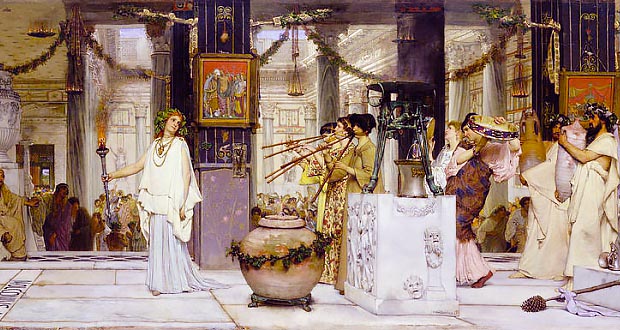The ancient Greeks identified the sign of fruitfulness as proof of the art of living well, as the true mark of civilization. On the shield of Achilles in the Iliad Homer depicts many scenes of civilized life that contrast from the barbarism of war, and in each picture some image of fruitfulness portrays the festive occasions of the sweetness of life.
The Shield of Achilles
In one scene the brides march through the streets while wedding songs, dancing, flutes, and harps fill the air. The marriages celebrate the fruitfulness of the family.
In another scene farmers plow a field with teams of horses as they uncover the rich, dark soil promising the fruitfulness of the earth when the reaping follows the sowing. In another picture harvesters are gathering and binding the grain as servants and women prepare the feast to celebrate the earth’s abundance.
Next appears an image of the grape harvest in a vineyard teeming with lustrous, purple fruit ripe for the picking as young men and women revel with singing and dancing. The purpose of life, love, and work is to be fruitful—a fruitfulness symbolic of life’s joy and goodness that the grape and wine signify.
The Great Rhythm of Nature
Homer again provides this image of Mother Nature’s cornucopia at the end of the Odyssey when Odysseus reminisces with his aging father about the time when they planted fruit trees in the orchard: “I begged you for everything I saw, a little boy trailing you through the orchard, picking our way among these trees, and you named them one by one. You gave me thirteen pear, ten apple trees and forty figs—and promised to give me, look, fifty vine rows…”
When Odysseus receives hospitality from the Phaeacians who welcome the weary traveler into their country, he marvels at the bountiful variety of the fruit teeming in the orchards: “Here luxuriant trees are always in their prime, pomegranates, and pears, and apples glowing red, succulent figs and olives swelling sleek and dark.”
The art of living, then, is to be fruitful and multiply, to sow and to reap, to receive and to give, to work and to receive the reward of honest toil that the banquets and celebrations honor. To live according to this great rhythm of Nature, one participates in a great design that transcends a momentary pleasure or one person’s individual happiness.
The Blessings of Fruitfulness
A civilized, human life is fruitful in the blessings of children, in the abundance of agriculture, and in the beautiful works of the practical and fine arts. Cooperating with Mother Nature’s plan and living in tune with the higher laws and sacred teachings of the gods always leads to the joy of the weddings, harvests, singing and dancing, and the prospering of a society in Homer’s epics.
In these works, the art of living does not consist of the multiplication of the prizes of war, the hedonistic pleasures of the body, or the riches or power acquired by conquest. In touch with reality, nature, and the divine, the Greeks measured the quality of a society’s culture by its beautiful and plentiful fruits. Odysseus marveled at not only the bountiful orchards of the Pheaecians but also at the skill of the women at the loom, the craftsmanship of the shipbuilders, and the art of the dancers.
The art of living well rejoices in the fruitfulness of love in marriages, in the abundance of the earth’s harvest of the field and orchard, and in the cultivation of the arts that beautify and elevate human life. Man must enrich, replenish, and beautify the world around him, not just live and die.
The Abundant Life
Christ teaches the same truth when He speaks of the abundant life (“I came that they may have life, and have it abundantly”), when He teaches the lesson about the trees that bear good fruit (“Every tree that does not bear good fruit is cut down, and thrown into the fire,”) and the parable of the talents in which He condemns the servant who failed to invest and multiply, yielding no interest: “You wicked and slothful servant!” Man must make, create, produce, or multiply.
At the end of the farming season, at the end of a person’s fertile years of marriage, and at the end of one’s life, it is Nature and God who judge the value of a human life and the quality of a society’s culture. The harvest of life in its good works needs to resemble the abundance of the field. The circle of life needs completion for the cycle of giving and receiving, loving and being loved, sowing and reaping to be passed down from one generation to the next and for civilization to be perpetuated.
As Patrick Buchanan demonstrates in The Death of the West, modern man with his high standard of living and advanced technology refuses to grasp this perennial truth that the Greek mind discovered. When families and nations do not increase and multiply, civilization itself suffers.
Ignoring this art of living, that the ancient Greeks identified as the hallmark of a society that knows how to enjoy life to its fullest and to appreciate all its pleasures, modern man merely exists or survives rather than lives well or abundantly.

 Seton Magazine Catholic Homeschool Articles, Advice & Resources
Seton Magazine Catholic Homeschool Articles, Advice & Resources
